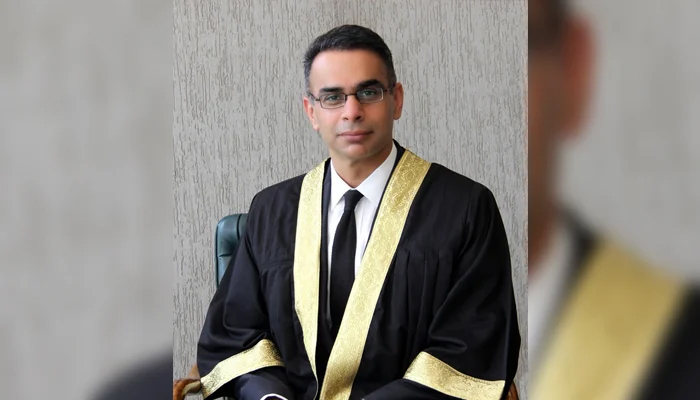IHC wants to know which agency is authorised to record phone calls
IHC issues order on ex-CJP Saqib Nisar's son plea; also questions if govt was empowered under law to record citizen's phone calls
ISLAMABAD: The Islamabad High Court (IHC) on Thursday raised the question about the agency which was authorised to record the phone calls, in the light of the audio leaks involving former chief justice of Pakistan (CJP) Saqib Nisar's son.
The concern was raised in an order issued by IHC Justice Babar Sattar on a plea filed by Najam Saqib, son of ex-CJP, against a special committee formed by National Assembly Speaker Raja Pervaiz Ashraf to probe audio clips allegedly featuring his voice.
The court also asked if the law empowered the government to record or surveil phone calls between the citizens, in a seven-page long order sheet issued by Justice Babar Sattar in response to Najam's plea.
Najam, in his plea, had submitted that the proceedings of the Aslam Bhootani-led NA special committee be stopped.
Subsequently, IHC stopped the special parliamentary body from proceeding against former CJP's son.
Now, in its detailed order, the federal capital’s top court has asked the NA to answer five questions pertaining to the matter. These questions range from parliament’s authority to inquire into acts of private citizens to which agency is permitted to record calls of private citizens.
While naming Aitezaz Ahsan, Makhdoom Ali Khan, Mian Raza Rabbani and Mohsin Shahnawaz Ranjha as amici to the court, it asked the attorney general in order, to assist it with the following questions:
- Is Parliament vested with legal authority to inquire into and investigate acts of private citizens who hold no public office or whether assuming such power intrudes into the domain of the Executive?
- Does the Constitution and the rules framed under it to regulate parliamentary procedure vest in the office of the Speaker National Assembly the authority to constitute a Special Committee to investigate actions attributable to a private citizen who is not a member of Parliament or a public officeholder?
- Does the Constitution or statutory law empower the Executive, and in the present case the Federal Government, to record or surveil phone calls or telecommunication between private citizens, and if so the supervisory and regulatory legal regime within which such recording and surveillance can take place?
- To the extent that recording of phone calls is permitted, which public authority or agency is authorized to do so, how is the right of a citizen to liberty and privacy to be balanced against the interest of the State in recording phone calls or undertaking surveillance and which agency is vested with legal authority to undertake such balancing exercise? and
- In the event that there is no legal sanction to tap phones, record telecommunication between citizens or undertake surveillance, which public authority or agency is to be held liable for such surveillance and encroachment over the right of citizens to liberty and privacy and/or release of illegally recorded private conversations to the public?
The court stated in the verdict that it was cognisant of the need to exercise restraint and show deference to the Parliament, and "minded not to suspend the circular dated 02.05.2023 constituting the special committee to audit, inquire and investigate the audio leaks of the petitioner".
During the hearing, the court remarked that hearing the stance of the federal government, interior ministry and Pakistan Telecommunication Authority (PTA)
It then directed the petitioner to submit an amended memo nominating the parties within three days and sought replies from all the parties including the NA secretary while adjourning the hearing till June 19.
-
Security forces gun down 30 terrorists in multiple IBOs in KP: ISPR
-
MQM-P calls for new province in Sindh
-
US report validates Pakistan military edge over India: PM
-
Banned TTP poses serious threat to Pakistan security: UNSC panel
-
CM Afridi clarifies remarks on by-poll after ECP requests army deployment
-
Dubai sees 3.2m Pakistani passengers in 2025 as airport sets new milestone
-
Security forces kill 23 Indian proxy terrorists in KP's Kurram
-
Pakistan to construct island to boost oil exploration: report












